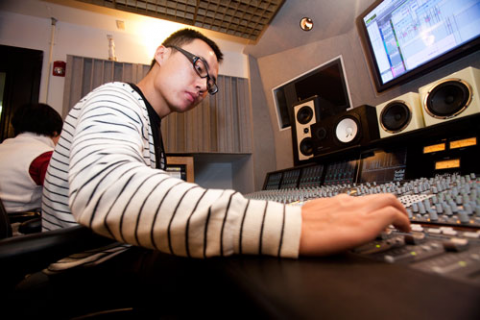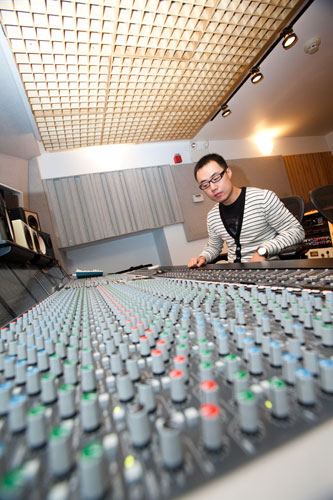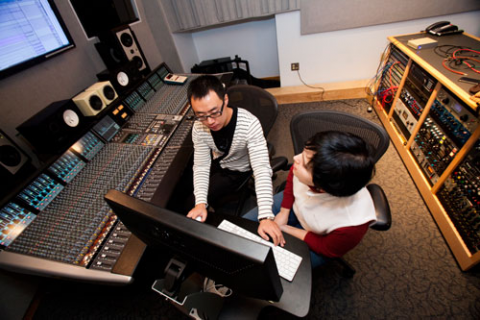Student Profile: Yang Song

Yang Song<br>
<b>Hometown:</b> Shanghai, China<br>
<b>Major:</b> Music Production and Engineering<br>
<b>Instrument:</b> Piano
Photo by Kelly Davidson

Song does the mixing for his final project in his Advanced Mix Lab class.
Photo by Kelly Davidson

Song works with Dominique Brown, the producer on the project.
Photo by Kelly Davidson
Yang Song was building a successful career as a music producer in China, counting R&B pop musician Isabelle Huang Ling as his first artist. But he realized he was missing some key components in his training. He was writing songs and arranging, but falling short when it came to other parts of the production process.
"Dangerous" by Cascade (Yang Song remix)
Song grew up in Xining, the largest city in the Tibetan province of Qinghai, and moved to Shanghai when he was 11. As the son of an amateur violinist and nephew of a bassoon teacher, he was always surrounded by music. From self-taught piano to conservatory, Song built a strong foundation. At Berklee, he's taking his music education to the next level.
Now 29, Song is learning all he can in preparation for launching his own music production company in Los Angeles after graduation in May. He's hoping to bridge Eastern and Western musical sensibilities and create an international music production network.
The following is an edited and condensed account of a conversation with Song.
What's your music background?
I learned a little piano when I was 5 or 6, but I only learned for two years and then I started to play trombone. My parents wanted me to apply to Shanghai Conservatory of Music. They chose trombone for me.
I knew I loved and enjoyed music and I liked to sing and play piano even though I didn't know how to play. Later, my parents saw I had a talent in music and let me choose an instrument. I like piano much better. I learned piano all by myself.
What was your role as music producer in China?
Most of the music is in Shanghai and Beijing. I moved between these two cities to do music production. I worked with a lot of famous Chinese artists, also in Hong Kong.
My dream is to be a producer. In my college years, I just learned MIDI and wrote songs, and then I got a chance to produce my first artist, Huang Ling. She wasn't famous then. She was my first client. She used my song and my lyrics in her album. I also did the whole process of the production, arranging, and part of the mixing. But I was not good at mixing and mastering. That's why I came here to learn.
How has Berklee furthered your music education?
My MP&E classes are fantastic and busy. Prince Charles Alexander is a really amazing Grammy-winning professor. He gives us a lot of ideas about how to do music production from beginning to end, how you can achieve your ideas. . . . The production process here is different than in China because of the different cultures. Here, we put emotion in music. In China, it's not so powerful. A string orchestra is very soft, even in pop music. Here, everything comes to your ear the first time. In China, you listen to it many more times for a deeper experience. I'm here to explore how to combine these two different cultural styles.
Berklee is the best school to come to for meeting people and getting a real music education. There are so many talented students here.
What is your experience being a Chinese student at Berklee? What do you think it means for the Chinese music industry to have more and more Berklee graduates?
I'm so proud of being a Chinese student here at Berklee, since we don't have many Chinese students here. I believe we are the pioneers of our generation to explore the culture of contemporary music at Berklee. And I'm so glad to see more and more Chinese students come here. I think more and more well-educated Chinese graduates from Berklee will provide huge amounts of energy for not only improving the quality of Chinese music but also changing the Chinese music industry. I believe there will be a bridge between Berklee and the Chinese music industry in the near future.
What's on the horizon?
I want to bring more Chinese artists here and American artists to China, have some artists experience the culture here, produce Western-based pop music with some Chinese elements, and bring artists to each place and influence their music. I want to go to L.A. and be a producer. I also want to start my own company, bring in more international business.
